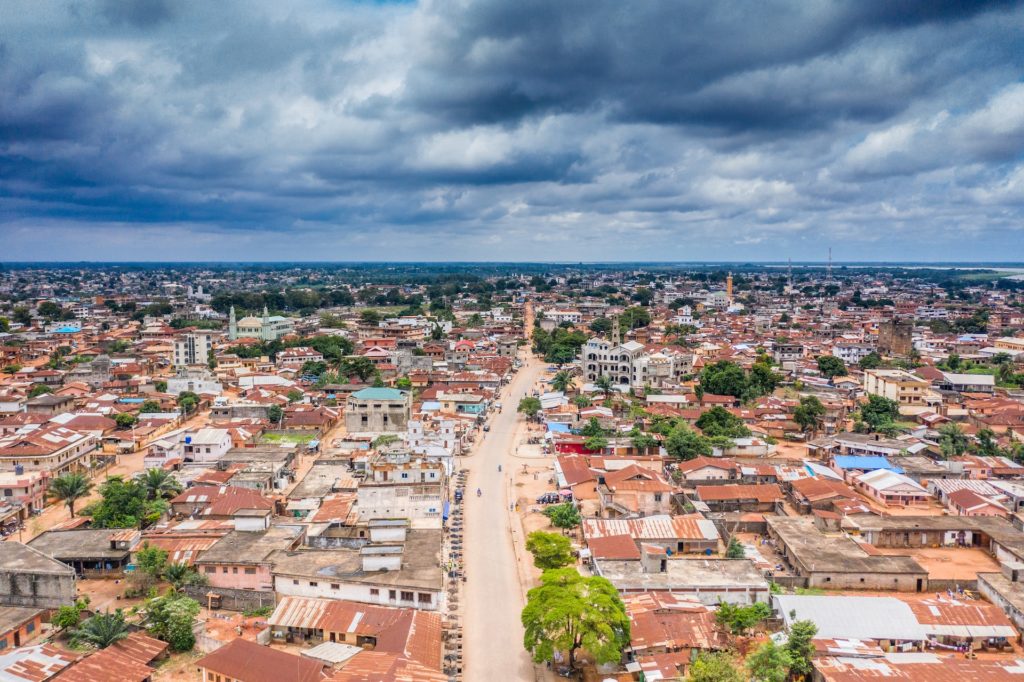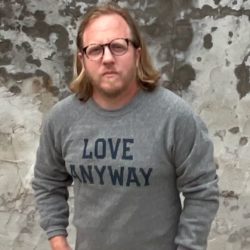One early Saturday morning in 2013, I was called into an unscheduled meeting at the school in Cotonou, Benin, where I worked and was to serve as director the following year.
The US Embassy, which ran the school, had decided to go another direction regarding the school’s director position. They gave me a choice: take a contract buyout and a ticket home or remain in the country on my own. I was given ten minutes to decide. Though I tried to get them to explain why this was happening, they refused to give me any reason for the decision.
I had a mile’s walk home to figure out how to explain the situation to my family and put together a plan for what to do next. As I walked, a flood of doubt, shame, and even guilt overwhelmed me. Why was this happening? What was I going to do? To say?
As I walked, my mind racing, I got a glimpse of La Porte du Retour near the beach. The archway is a monument to commemorate the thousands sold into slavery—and who departed Africa from these very same beaches where my family and I spent our Sundays. My children laughed and played here with other children, even though they didn’t share a language. I had sat on those beaches and contemplated the immediate and generational consequences of the evils that had happened here in earlier centuries; I had also sat there and talked with my dear local friend about our dreams and our children, railing against corruption and cracking each other up. These beaches had a profound impact on me.

In that moment, a sense of peace came over me, and I shifted my thought process to ask a different series of questions. How could this experience be beneficial? What do I really want to do now?
The Difficult Path to Purpose
You see, this wasn’t the first time I’d been asked to unexpectedly leave a country. It wasn’t even the first time that year.
I’d come to Benin four months earlier from China. Four months prior to that, I’d left my home in the United States and set out for China with a plan that I was confident would solve all my problems. My possessions, my comfortable suburban home, my career—I abandoned them all for the pursuit of happiness via the expat life. The change of geography, career, and pace of living would, I was sure, mend my troubled marriage, strengthen my family, and re-energize me professionally. I would have my very own Swiss Family Robinson.
Foolproof, right?
I’d taken my family to China for what was supposed to be a two-year commitment as the director of an international school. I had planned that, after that, we’d move somewhere with more sunshine and less communism. That second step, however, came much sooner than I’d planned. After four months of promising that proper visas were forthcoming, the Chinese Communist Party indicated they would not grant my family the necessary visas to stay in the country and we had to depart immediately.
Around this same time, my wife informed me that my marriage was indeed over. My foolproof plan was unraveling.
My immediate options were to return home or transfer to Benin, Africa. But there was no “home” to return to, whereas Benin offered sunshine another fresh start—so that’s where we landed. Preserving my family unit was my highest priority, but as I learned in those months, no matter how much you want something—no matter how much you plan and work for it—you don’t always get it. Even if it’s the thing you care about most.
As I learned in those months, no matter how much you want something—no matter how much you plan and work for it—you don’t always get it. Even if it’s the thing you care about most.

The Seeds of Positive Disintegration
When I learned I’d be leaving Benin, I spoke a prayer of positive intention. In this prayer, I laid out what I hoped to do with the next chapters of my life—a determination to act and overcome rather than stew in the chaos.
This prayer would turn out to have a profound impact on the evolution of my consciousness. Over the course of the next ten years, I saw manifestations of this prayer unfold in real time. It hasn’t been easy. I was in the midst of what would be an entire decade of a grueling personal process that I would later come to know as positive disintegration.
In this prayer, I laid out what I hoped to do with the next chapters of my life—a determination to act and overcome rather than stew in the chaos.
Throughout this process, I encountered the cornucopia of painful circumstances, challenging people, and ideas necessary to make my prayer come to fruition. The gist of that prayer was this: May I find a way to use my experience to help others—to increase their well-being and decrease human division.
However, in 2013, I still had more pain to endure and more challenging people to meet—and I had to develop ways to be resilient to both.
The most difficult part was losing my family unit. It was everything I had dreamed of as a child and worked towards as an adult—and now it was gone. But losing everything dear to me and recovering from that loss fortified me for the final grueling phase of my positive disintegration process. After all, once you lose everything that’s important, you can never experience that loss again.
Becoming a SEL Specialist
As for my career, after returning from Benin, I found a job in Texas as a social and emotional learning (SEL) specialist. In this role, I learned—and then taught others—about things like mindsets, meditation, self-compassion, and ways to connect with others. I had left public education in 2012 because I saw it as a system failing kids, families, and generations. When I took that job, I saw SEL as the missing piece that could help fix the K-12 system.
After a few years, however, a dramatic shift in theory and practice changed that. This shift created yet another crisis for me. For most of my life, I believed my values were most people’s values. Between 2017 and 2021, I learned this is not the case. In fact, I discovered that, to some, my values were evil.
For most of my life, I believed my values were most people’s values. Between 2017 and 2021, I discovered that, to some, my values were evil.
What are these dangerous values I have? They are my beliefs that people should be able to pursue their own well-being without harming each other and that, beneath our differences, we share a common humanity.
Facing the Successor Ideology
In 2017, as my divorce was finalized, my profession shifted from theory and practices aligned with my values to those that were in direct and open conflict with them. Instead of the liberal humanism of the Enlightenment, a successor ideology had emerged. This successor ideology is what is sometimes referred to as “social justice” or being “woke.” “Equality”—that is, concern with equal opportunity—was out; “equity”—concern with equal outcomes—was in. Judgment of the content of one’s character was out; judgment of the color of one’s skin was in.
I understood this to be based in a political philosophy that viewed the individual as the source of systemic injustice rather than each individual having worth and value. My sincere belief is that this successor ideology is impairing personal well-being, human relationships, and even creativity. I wonder about a society that has a worldview colored by cynicism rather than hope; that does the emotionally satisfying work of dismantling while neglecting the far more difficult work of constructing; and that embraces biologically reinforced tribalism over human dignity.
At first, it was hope that gave me the courage to question: you see, I believed that no matter how appealing the successor ideology looked to them at first glance, my colleagues would eventually open up to a professional discussion about what practices best lead to social and emotional well-being.
I believed that my colleagues would eventually open up to a professional discussion about what practices best lead to social and emotional well-being. But that hope proved to be misplaced.
But that hope proved to be misplaced. When I asked questions, my colleagues criticized me as upholding white supremacy and harming others. They made these claims without evidence, and without engaging me in conversation. Over the years I kept trying to offer counterpoints, but my pleas were ignored.
I grew more and more isolated. This period of time, at least, provided me an opportunity to study the ideological impact on my profession and the way people functioned within it. These observations instilled in me a desire to fight back against what was happening because I knew this was impacting people across the USA and even other parts of the world.
The Crisis Moment
In Spring 2021, after my field’s leading professional organization formally shifted its theory and practices to align with this new way of thinking, my then-current job description was rewritten, and I would have to reapply to keep my position. I would have been the chosen candidate if I had wanted it. The only problem was that the new position stipulated that the person in this position would operate within the new ideological framework. No longer could I question it or avoid it. I had to commit to teach others this worldview and promote it in a positive light.
I made one last attempt to engage. At a working group meeting, I stated my views directly: “The ideological approach we are using is a complete rejection of human dignity and Enlightenment philosophy.”
Looking around—the expressions, the uncomfortable shifting—I knew what the response would be.
“It sounds like you want to go a different direction than we are going,” one of them said.
That was when I realized our differences were irreconcilable—and I had a major decision to make. I could choose to reject my core values to stay on the path of safety and security, or I could risk everything to adhere to those values.
I had a major decision to make. I could choose to reject my core values to stay on the path of safety and security, or I could risk everything to adhere to those values.
But one thought gave me hope: despite what I saw in that uncomfortable room, “my values” truly were not just mine. Deep down, I believe they are everyone’s. I couldn’t imagine my children living in a world the new ideology sought to create—what life would look like for people in twenty, fifty, or one hundred years if we followed this path to its natural conclusion. I could not justify going along with it. Even if going along with it guaranteed food and housing.
Once again, I faced that feeling of dramatic transition with no safety net. This time, it happened during a global pandemic, and when my housing lease was about to expire.
As I had in Benin, I said another prayer of positive intent. But this time, I told God, “My hands are your hands. Please guide me so that I can use them effectively.” It was an exercise in faith like I’d never pursued before, but even during those most chaotic moments, I continued to lean in.

The Free Fall
Imagine standing at the ledge of a cliff so tall you can’t see the bottom. Now, close your eyes, leap head first, and calmly fall, having faith that still waters will catch you without harm.
I spent the next several months in that free fall. Some days, I still wonder if I’ve really landed or if I’m just hitting breaks on the way down. But along the way, I’ve found an entire community of people who do share my values—who see the damage the successor ideology is causing and seek ways to mend what it’s torn. From there, I’ve found meaningful professional collaborations and developed new friendships.
As I write this, in 2022, I am openly promoting the ideas that were my “Beninese Dream” from 2013—and I’m finally having the positive impact I prayed for. In 2017, immediately after my divorce, I started EmpowerED Pathways as side project; it was a place for me to put all those ideas I’d been formulating about a humanity-centered framework for personal well-being and relational trust as well as a vehicle for explaining how so-called social justice practices were having adverse effects on both. I kept thinking that somebody had to do something, and at the time, I thought, “Why not me?”
I kept thinking that somebody had to do something, and at the time, I thought, “Why not me?”
This year, I’ve been able to work within my value system to advocate for well being, diversity of thought, and lessening the stranglehold of professional work on society through the organizations EmpowerED Pathways and Free Black Thought. I also remain hopeful that the ideological barriers that are dividing us will break down—and I’m working tirelessly to make that happen. Despite my divorce and the fact that my children are at or nearing adulthood, family remains one of my core values, and that is reflected in my work. Working everyday to make their world a more peaceful, resilient, and connected place continues to motivate and energize me.
Introducing Empowered Humanity Theory
Those ideas that I gave up my twenty-one year career to defend, I now call Empowered Humanity Theory (EHT). You can read about them here.
Advocating for the individual and for a truly inclusive society aren’t currently popular ideas—at least, not in certain circles. They’re counter to the dominant institutional and cultural practices; the ideas I have put forth may look reasonable to many reading this, but the fact is, they are now met with hostility. For people in many institutional leadership circles, inclusivity has a very shallow meaning; if you dig a little, you’ll see they don’t mean it the way most of us do. They mean inclusivity based on superficial characteristics—never of competing perspectives.
This is the task I’m charged with. I persist because the road ahead for humanity looks extremely unpleasant from here, and I want us to get off of it and onto another. I’m able to persist because my convictions and understanding leave me no choice but to do so.
In fact, it was precisely the attitudes and practices of EHT that enabled me to persist when I’d lost everything of importance to me. Through EHT, I developed a value-centered identity rather than a social-justice derived intersectional one. Core to EHT is the ability to honor the dignity of all, even during conflict and towards those that showed me none. EHT teaches how fear and judgment can limit potential and cause harm; it taught me to disrupt thoughts of fear and judgment with thoughts of inquiry and compassion. Choosing to frequently engage in practices that strengthen awareness, equanimity, kindness, compassion, and connectedness keeps me grounded, secure in attachment, and connected with others. It energizes me even if the status quo bemoans me. These are values I came to elevate during my positive disintegration, and I am committed to following this higher path.
Choosing to frequently engage in practices that strengthen awareness, equanimity, kindness, compassion, and connectedness keeps me grounded, secure in attachment, and connected with others.
However difficult the path forward from here may be, it will not be worse than what I have been through. I will never experience those levels of loss again, and my faith and sense of purpose are stronger than ever.
Examining who I am today, I’m grateful for the process I went through. Reflecting on the torment, isolation, and chaos I endured, I’m grateful it’s not a process all need to bear. But most human beings will face hurdles of some sort during their time on this earth. Perhaps this story will help others identify the source of their torment and provide awareness of how the attitudes and practices of Empowered Humanity Theory can support them.
Header image courtesy Hana El Zohiry on Unsplash




